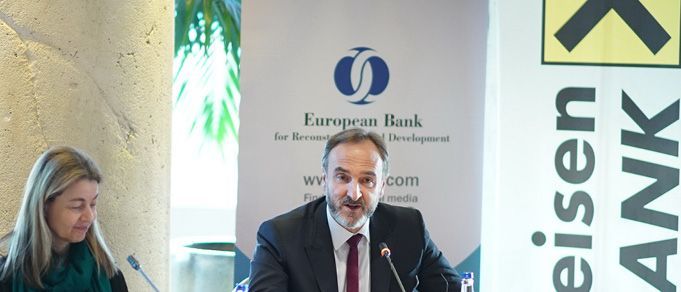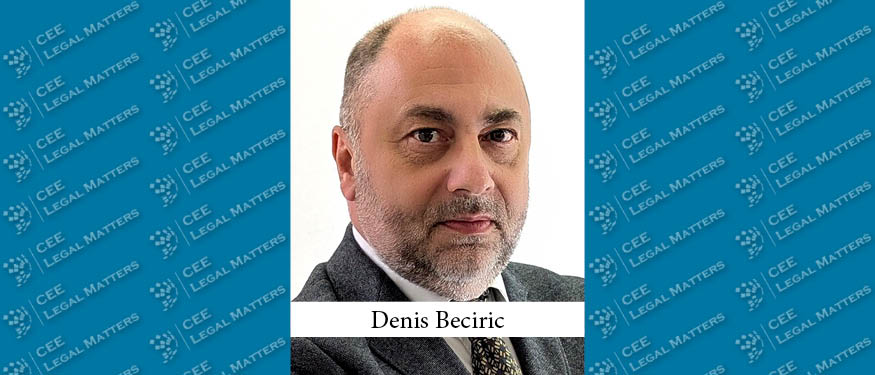The Deal: On December 8, 2016, CEE Legal Matters reported that Wolf Theiss had advised the EBRD on its issuance of RSD 2.5 trillion Floating Rate Bonds due December 2019. AP Legal advised Raiffeisen Banka A.D., Beograd, acting as underwriter for the issuance, and Harrisons advised marketing agent Citigroup Global Markets Limited.
The issuance – which was denominated in Serbian dinar, listed on the Belgrade Stock Exchange (BELEX), and governed by Serbian law – was the first by an international financial institution in Serbia.
We reached out to several of the individuals involved in the deal for information.
The Players:
- Wolf Theiss: Milos Andjelkovic, Senior Associate
- AP Legal: Aleksandar Preradovic, Managing Partner
- Raiffeisen Banka A.D., Beograd: Dusan Mitrovic, Head of Legal
- Harrisons: Ines Matijevic, Consultant, Head of Finance and Capital Markets Group
CEELM: How did you each become involved in this matter? Why and when were you selected as external counsel initially by your clients, and Dusan, why did Raiffeisen reach out to AP Legal?
Wolf Theiss: Our firm had worked with the EBRD in the past. We successfully pitched for this particular mandate and so were involved in the bond issuance process from the very beginning.
AP Legal: We have a long history of working with Raiffeisen Banka Beograd on various types of transactions. I believe that our successful cooperation in the past as well as our previous experience with IFIs and knowledge of IFI expectations when it comes to the form and content of transaction documentation and transaction management were the key factors why Raiffeisen Banka Beograd decided to instruct us in this matter.
Raiffeisen: Raiffeisen bank chose AP Legal based on its track records; i.e., Mr. Preradovic’s experience and knowledge in banking and finance. We have cooperated in the past and we as a bank respect his work very much. The quality of his work and the price for it are more than favorable. Our working relationship was excellent.
Harrisons: Citigroup is a long-standing client of Harrisons – Harrisons actually helped Citibank NA set up its operations in Serbia by establishing a representative office in Belgrade. We regularly advise Citi concerning various aspects of the Serbian legal regime, from purely banking and financing-related matters to day-to-day operational issues like employment-related issues. So it was natural that when Citi needed assistance from local lawyers on this project they approached Harrisons.
CEELM: What, exactly, was the initial mandate when you were retained for this project (as compared to the final result)?
Wolf Theiss: As issuer`s counsel, we were mainly responsible for the drafting of the prospectus for the public offer and listing of the bond and the handling of the proceeding for the approval of the prospectus by the Serbian competent authority.
AP Legal: Our initial mandate was provision of customary capacity and enforceability legal opinion on transaction documentation for the benefit of Raiffiesen a.d. Beograd.
Harrisons: At the beginning, Citi was contemplating acting as Marketing Agent both in Serbia and abroad, and it was exploring the possibility of acting as a co-underwriter as well (although this idea was abandoned at a very early stage of the process).
CEELM: Who was on your teams, and what were their individual responsibilities?
Wolf Theiss: The Wolf Theiss team consisted of me and Associate Nevena Skocic, from Serbia, and Partner Alexander Haas and Associate Nikolaus Dinhof in Austria.
The Serbian team was responsible for providing feedback on Serbian law requirements, communicating with the regulatory bodies on the ground, and getting all the necessary documents through, while the Austrian team provided much-needed insight into international practice for this type of transaction and practical suggestions for possible solutions for many administrative hurdles that inevitably show up on a milestone transaction such as this.
AP Legal: The AP Legal team consisted of myself and Ms. Aleksandra Jovic. My primary responsibility was drafting the transaction agreements governed by Serbian law and coordinating with our client and the legal teams of the other participants in the process. Aleksandra’s responsibility was reviewing and input on the drafting of transaction documentation (including the prospectus and listing application) and providing ongoing regulatory legal advice on certain aspects of the transaction.
Raiffeisen: Raiffeisen’s Treasury department was in charge of the commercial part of the business. I was in charge of legal issues and coordinated with AP legal.
Harrisons: Harrisons was represented by Jovan Cirkovic and me. We followed the process from the initial structuring phase to the finalization of the bond issuance.
CEELM: How was the issuance structured, why was it structured that way, and what was your role in helping it get there?
Wolf Theiss: The EBRD is the first multilateral lender to raise funds on the local market in dinars. This first bond from the EBRD in the Serbian currency is a three-year floating-rate issue that pays interest at the three-month Belgrade Interbank Offered Rate (Belibor) plus 0.4 percent. The bonds are governed by Serbian legislation and will be traded on the Belgrade Stock Exchange.
We are proud that our team was leading counsel on a transaction of this magnitude and that it was our team’s legal advice and effort that helped get this deal through.
AP Legal: In addition to the role of underwriter (in Serbian pokrovitelj emisije) in the sense of Serbia’s Capital Markets Act, Raiffeisen’s role in this transaction was calculation and paying agent of the issuer. In that capacity Raiffeisen was responsible for: (a) settlement and registration of the bonds with the Central Registry of Securities on the issue date; and (b) calculating and making payments relating to the bonds. Finally, Raiffeisen also acted as the listing agent of the issuer responsible for making the application for admission to trading of the bonds on the prime market of the BELEX. The scope of Raiffeisen’s role in the transaction was agreed with the issuer prior to the commencement of our engagement.
Harrisons: Citigroup Global Markets Limited acted as Marketing Agent in the transaction.
CEELM: What was the most challenging or frustrating part of the process?
Wolf Theiss: Since this was the very first supranational bond issuance in Serbia, the most challenging part of it was to implement international standards that the market expects the EBRD to meet. Lack of any previous practice in Serbia that could be used as a guideline was at times challenging. However, since our Vienna team has had ample international experience in similar transactions, they were able to provide suggestions on how to deal with every issue we encountered in the process.
AP Legal: Taking into consideration the special status of the issuer as an international financial institution and its specific requirements when it comes to the form and content of the contracts and other documentation related to the bond issuance (including those related to disclosure) the most challenging part of the process was to get to the point when the entire set of transaction documents was fully aligned among all participants in the process. This line of work required a lot of interaction with competent local authorities and institutions. I would like to emphasize the very pro-active and constructive role of the Securities Commission, Central Registry, and BELEX, which significantly contributed to successful realization of this precedent transaction on the local market.
Raiffeisen: Dealing with the State Authorities (the Tax Authorities, Security and Exchange Commission, etc.). Due to the strict regulations relating to the deal and specific wishes of the EBRD, the most frustrating part was fulfilling legal requirements and the EBRD’s wishes at the same time. The EBRD has its own internal rules, which were not 100% aligned with Serbian legislation. The EBRD did not want to drop its internal regulations, which is normal. So, it was an issue for us to fulfill both EBRD’s wish not to break its internal regulations and that everything be in line with the Serbian legislation at the same time. This was a challenge for us as well as for the EBRD’s legal counselors.
Harrisons: We believe that Wolf Theiss and AP Legal are better positioned to answer this and the following question bearing in mind our (and Citibank’s) to some extent limited involvement in the process, but we would say that being the debut issue of debt securities by a supranational in dinars on the Serbian market, the issue had to set the path/precedent for many aspects of the transaction. As Serbian regulations are not always crystal clear there were a number of ambiguities that had to be resolved during the process. This required close collaboration from all participants in the process, from the EBRD and Raiffeisen bank and their advisors on one side to the Serbian Commission for Securities and other regulators on the other side. This process was not always easy and smooth and faced hiccups from time to time.
CEELM: Was there any part of the process that was unusually or unexpectedly easy?
Wolf Theiss: Serbian administration is known to be, at times, conservative. However, due to the exceptional importance of this transaction for the Serbian market, we encountered nothing but support, cooperation, and openness from the administrative bodies involved, starting with the Securities Commission.
AP Legal: Generally, for the reasons stated above the transaction was quite complex and challenging. In my opinion agreeing on the contractual documentation related to the issuance with the client and other counterparties was probably the easiest part in the process.
Raiffeisen: Preparation of the documentation in cooperation with AP Legal was the easiest part of the job.
Harrisons: No.
CEELM: Did the final result match your initial mandate, or did it change/transform somehow from what was initially anticipated?
Wolf Theiss: In comparison to the initial mandate, the final scope of our work included much more administrative work than initially expected. The difference arose due to the fact that the draft of prospectus that we prepared and that was approved by the EBRD and Raiffeisen significantly differed from the documentation that was deemed as “standard” in the Serbian market so far. Consequently, certain points of the EBRD’s prospectus had to be explained to the authorities, which required somewhat extensive communication. This communication was helmed by Raiffeisen, as was understood from the beginning, but together with them we soon came to realize it would be more efficient if we were to be involved, since we had the most comprehensive understanding of the documentation. This is where our mandate went out of the original scope.
AP Legal: As the overall transaction structure turned out to be more complex than initially anticipated by the client our mandate evolved to drafting key transaction agreements governed by Serbian law (the subscription agreement, calculation and paying agency agreement, mandate letters, and powers of attorney), assistance with the drafting of other transaction documents (e.g., the prospectus and applications for listing of the bonds on BELEX, etc.) and providing ongoing legal advice as to various legal aspects of the transaction.
Harrisons: As a result of restrictions imposed by Serbian capital markets regulations and after discussions both with the EBRD as issuer and its advisors and with the Serbian Securities Commission, it was decided that Citigroup Global Markets Limited would act as Marketing Agent only outside of Serbia, in a limited number of countries which were of interest to the issuer.
CEELM: What individuals at your clients instructed each of you, and how would you describe your working relationship with them?
Wolf Theiss: We were directed by Ajay Sud and Joan Grogan, both Senior Counsels at the EBRD, and Isabelle Laurent, the EBRD’s Head of Funding, who are exceptional professionals with vast experience in this type of transaction. They were involved in every step of the process and their support was crucial in getting the deal through. The preparation of the transaction lasted for months (and even that was only made possible by Ms. Laurent’s work of many years to model the Serbian legislative framework). During this time we were in daily communication, which was the only way to reach the successful closing.
AP Legal: Our primary point of contact was Mr. Dusan Mitrovic, Head of Legal Division at Raiffeisen Banka Beograd. We also worked closely with Mr. Milan Milekic and Mr. Joko Lolo Tomic from Raiffeisen’s investment banking and treasury division. All members of our client’s team showed great dedication to the project. I would describe our overall working relationship with Raiffeisen’s team as excellent.
Harrisons: As is usually the case when working with Citigroup, with whom we have a longstanding and strong relationship based on mutual trust, we had an excellent relationship with the Citigroup team working on this deal, involving smooth correspondence, precise instructions, and openly sharing ideas regarding the project.
CEELM: How would you describe the working relationship with your counterparts on the deal?
Wolf Theiss: During the process we had very little direct communication with Harrison Solicitors and AP Legal. Harrison Solicitors mostly dealt with the marketing aspect of the transaction, which did not significantly overlap with our scope of work. We had a lot of communication with Raiffeisen Banka Beograd, including quite a few meetings; although we are aware that they received significant support from AP Legal, we did not have many chances to interact with them directly.
AP Legal: The legal teams of Wolf Theiss and Harrison Solicitors involved in the transaction showed great dedication and a high level of professionalism. I would describe our overall working relationship with them as excellent.
Raiffeisen: Excellent, especially with the client’s legal counselors – both internal and external. We understand each other very easily.
Harrisons: Bearing in mind the limited role Citibank took in this transaction as Marketing Agent, our work on this transaction was also to some extent limited in scope. This being said, we had great cooperation with both Wolf Theiss and AP Legal on all aspects of the transaction to the extent relevant for the role Citigroup was taking in this transaction. They, and in particular the Wolf Theiss team who had the most difficult task of bringing together the requirements and needs of EBRD as the issuer and boundaries imposed by Serbian regulations seemed very knowledgeable and focused on the transaction. They acted proactively on all matters involving Citigroup.
CEELM: How would you describe the significance of the deal?
Wolf Theiss: As mentioned, this deal was very important for Serbia: with more than 70 percent of its borrowing in foreign currencies, mostly in the euro, Serbia has one of the highest levels of foreign currency borrowing among all of the countries the EBRD works with. This exposes unhedged borrowers to significant exchange rate risks. The dinar bond, which will allow the EBRD to lend in dinars to domestic borrowers, is in line with the efforts of the National Bank of Serbia to tackle the high levels of euro-ization and increase the availability of dinar financing (dinarization).
The EBRD will be able to lend the proceeds from the 2.5 billion-dinar bond to domestic borrowers who can take on the debt without fear of foreign exchange risk. This was an important step aimed at strengthening the Serbian capital market with the first issue of a supranational bond in Serbian dinars and will also increase the EBRD’s ability to lend to the Serbian economy in the local currency and thus contribute to the dinarization of Serbian finance.
AP Legal: Notwithstanding the relatively small volume of the issuance, this precedent-setting transaction represents a significant achievement for all participants in the process. I believe that this deal will further enhance the position of Raiffeisen Banka Beograd as one of very few banks on the local market which are capable of providing underwriting, agency, and other related services to other IFIs and DFIs which are contemplating issuing RSD-denominated debts securities on the Serbian market. The deal is also significant to the Serbian economy, as it will provide Serbian companies and municipalities with access to new sources of funding in local currency.
Harrisons: As the first issuance of its kind in Serbia, the issue of a supranational bond in Serbian dinars will hopefully assist in the development of Serbian capital markets and help, at least to some extent, dinarization of the Serbian financing market. There are also hopes that it will foster development of the Serbian debts securities market in general as the bond is admitted to trading on the Belgrade Stock Exchange. As for Citigroup, it underlines their continued commitment to Serbia.
This Article was originally published in Issue 4.3 of the CEE Legal Matters Magazine. If you would like to receive a hard copy of the magazine, you can subscribe here.

















